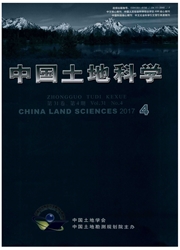

 中文摘要:
中文摘要:
研究目的:将外出农民工的土地处置方式分为家庭耕种、土地流转和抛荒三种,对农民工选择每种方式的影响机理进行理论分析和实证检验。研究方法:问卷调查法和多项选择模型回归分析。研究结果:(1)69.89%的农民工选择家庭耕种的处置方式,土地流转和抛荒的比例相对较小;(2)家庭人口数与土地的家庭耕种之间存在显著的正相关关系;随着人力资本状况的改善、工资水平和就业稳定性的增加、回家路程时间的延长,农民工选择土地流转或抛荒的可能性将显著上升;(3)农民工进城之前从事过农业生产的经历将显著降低土地抛荒的概率。研究结论:要重视对农村土地制度变革的前瞻性研究;改善农民工在城市中的就业状况,促进土地流转市场的发育和完善。
 英文摘要:
英文摘要:
The purpose of this article is to analyze the land use decisions of the off-farm employed farmers theoretically and empirically in terms of three categories, such as household farming, land transfer, and abandoning land. Melhods used include questionnaire survey and regression. The results show that 1 ) there were 69.89% of the off-farm loyed farmers choose husehohl farming, and land transfer or abandoning land was the relatively small. 2) There was significantly positive correlation between the number of off-farm workers and the choosing of househohl farming. With the improvemenl of human capital, the enhancement of the stahility of wage levels antt employment, anti |he increase of the distance from working places to hometown, the off-farm workers would like to transfer land or !o abandon land significantly. 3 ) The more experience of agricultural production the less probability that the uff-farm farmers will abandon land. The paper concludes that it is meaningful to pay more attention to the rural land instilutional shnlies. Practically it is necessary to ameliorate the work condition for the off-farm employed farmers in cities, and it is important to develop the land transfer market for their land.
 同期刊论文项目
同期刊论文项目
 同项目期刊论文
同项目期刊论文
 期刊信息
期刊信息
